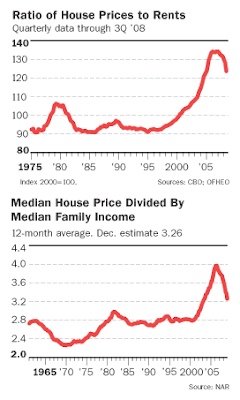As John Maynard Keynes famously observed, “the market can stay irrational longer than you can stay solvent.”
Or, in the case of housing the last decade-plus: ‘stay above trend line longer than you can stay in a rental.’
Citing the charts reproduced at right, commentators like Barron’s Alan Abelson make the point that, despite housing’s 25% fall nationally from the 2006 peak, it’s still well above historical trend lines.
The obvious implication is, don’t rush (back) into the housing market just yet.
The only problem with that advice is that anyone concerned about historical valuations would have been relegated to the sidelines years ago.
Housing prices as a percentage of rent have been above trend line since at least 1998; as a percentage of median family income, since 2001. Some economists might even argue that the latter ratio has been above the long-term trend line since the late ’70’s!
That’s a long time to stay in your in-laws’ basement (or a cramped house you bought before you had kids).
In fact, despite the widespread pain in housing since 2006, anyone who bought in 2000 would still be up 30%. That compares with a 50% drop in equities since then. To paraphrase Churchill’s line about democracy, “housing is a terrible investment . . except for all the others.”
Housing’s Benefits
Of course, anyone who’s owned their home for almost a decade would likely have amortized a nice chunk of principal by now, and also have benefited from the tax deductions associated with paying mortgage interest.
Meanwhile, anyone selling with a gain up to $500k ($250k for singles) would have escaped paying capital gains taxes, thanks to housing’s favored tax treatment.
But most importantly, anyone who bought a home in 2000 . . . would have enjoyed living in their own home since 2000.
As a Realtor with an economics background, my biggest criticism of the much-cited housing price/rent ratio is the underlying assumption that the rental and purchase markets are, if not interchangeable, at least close substitutes.
That may be true in some markets, but not in the one I work in, the Twin Cities.
In general, rental homes here are located in less desirable neighborhoods, are in worse condition, and have fewer amenities, than homes listed for sale. That’s especially true as a soft market swells the number of rentals: “involuntary” landlords who can’t attract a buyer — or can’t afford to sell their homes because they’re underwater — frequently lack the time and money to keep up their rental properties.
Unlike, say, Manhattan, in the Midwest owning your own home is as much as lifestyle decision as it is an economic or financial one.
It’s one thing to jump into (or out of) stocks based on historical valuations.
Doing that with your family, and disrupting your kids’ friendships, schooling, etc. is a sacrifice most people aren’t willing to make.

